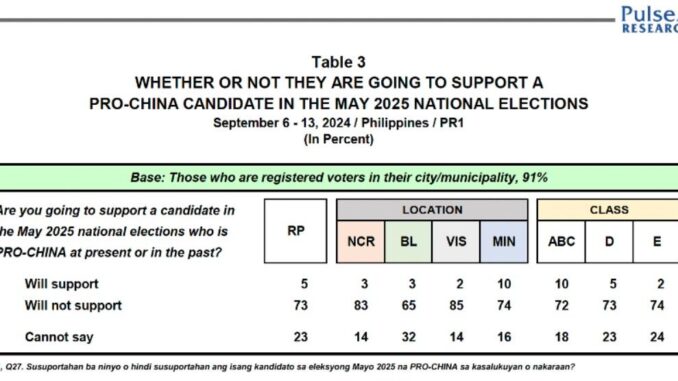
Seven out of 10 of Filipinos won’t support pro-China candidates for the 2025 midterm polls, a Pulse Asia commissioned poll showed Monday.
The Stratbase Group-commissioned Pulse Asia survey, which was conducted last September 6 to 13, specifically revealed that 73% of Filipinos said that they will not support pro-China candidates in May 2025 as against 5% who will support pro-China candidates.
There were 23% who cannot say whether or not they will support pro-China candidates.
“The sentiment among Filipinos reflects a profound mistrust toward candidates who align themselves with China. Many Filipinos feel that China’s actions, particularly in the West Philippine Sea, directly challenge our sovereignty and undermine our nation’s interests,” Stratbase Group CEO and founder Prof. Dindo Manhit said in a statement.
“This prevailing view is driven by both patriotic sentiment and a desire for leaders who will prioritize the Philippines’ long-term security and prosperity,” Manhit added.
Electing pro-China candidates, Manhit said, poses significant risks since it could lead to policies that compromise the Philippines’ territorial integrity and economic interests.
“Such candidates will become direct conduits for Chinese influence, which can jeopardize our national security and further empower a state that has repeatedly disregarded our sovereign rights and the international rules-based-order. This is not just a political choice but a decision that can jeopardize our future and our nation’s standing in the global arena,” Manhit said.
Trusted partner
The same survey also showed that only one percent of Filipinos regard China as a trusted partner of the Philippines in terms of national development.
The US is the most trusted partner of the Philippines in national development, with 79%.
Japan is next at 50%, followed by Canada at 43%, Australia at 42%, and Great Britain/United Kingdom at 18%. China had 1%.
“Filipinos are right to question China’s role as a reliable development partner. Beyond the West Philippine Sea disputes, raging issues like the corrosive impact of POGOs and incidents involving alleged Chinese espionage, such as the case of Alice Guo, have further fueled distrust,” Manhit said.
“Our people need trustworthy partners who respect our laws and our sovereignty. China’s actions have repeatedly contradicted these fundamental principles, casting doubt on their sincerity in supporting our national development goals,” he added.
The Pulse Asia poll had 1,200 respondents and had a ± 3 margin of error.
Philippines’ legal claims
Back in July 2016, the Hague-based Permanent Court of Arbitration invalidated Beijing’s massive claims in South China Sea
The PCA ruled that the Ayungin Shoal, the Spratly Islands, Panganiban or Mischief Reef, and Recto or Reed Bank in the West Philippine Sea are within the Philippines’ Exclusive Economic Zone (EEZ).
This ruling stemmed from the Philippines government’s 2013 case against China over repeated Chinese aggression within the Philippines’ EEZ in the South China Sea identified as West Philippine Sea by the Philippines.
Moreover, the July 2016 Hague court outlawed Chinese aggression in the Philippines’ EEZ by stating that Scarborough Shoal, a rich fish resource, is a common fishing ground.
China, however, refuses to recognize the court ruling to this day and is undeterred in deploying aggression against Philippine vessels and personnel. —KG, GMA Integrated News





Be the first to comment